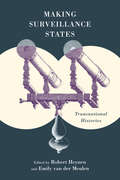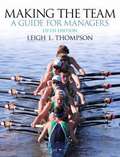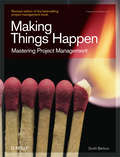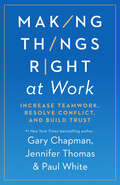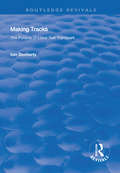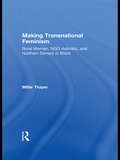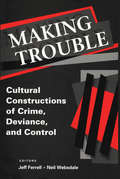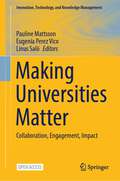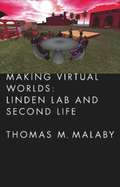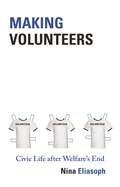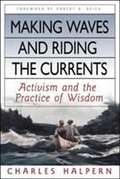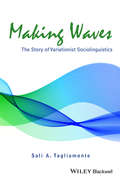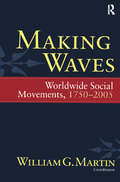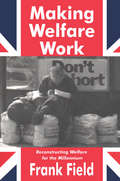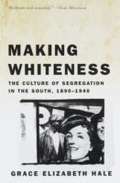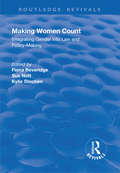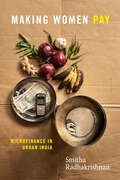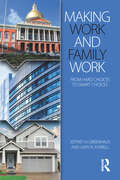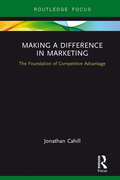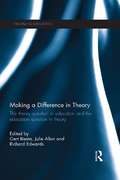- Table View
- List View
Making Suburbia: New Histories of Everyday America
by Katherine Solomonson John Archer Paul J. P. SandulWhat are the suburbs? The popular vision of monotonous streets curving into culs-de-sac and emerald lawns unfurling from nearly identical houses would have us believe that suburbia is a boring, homogeneous, and alienating place. But this stereotypical portrayal of the suburbs tells us very little about the lives of the people who actually live there. Making Suburbia offers a diverse collection of essays that examine how the history and landscape of the American suburb is constructed through the everyday actions and experiences of its inhabitants.From home decor and garage rock to modernist shopping malls and holiday parades, contributors explore how suburbanites actively created the spaces of suburbia. The volume is divided into four parts, each of which addresses a distinct aspect of the ways in which suburbia is lived in and made. More than twenty essays range from Becky Nicolaides&’s chronicle of cross-racial alliances in Pasadena, to Jodi Rios&’s investigation of St. Louis residents&’ debates over public space and behavior, to Andrew Friedman&’s story of Cold War double agents who used the suburban milieu as a cover for their espionage.Presenting a wide variety of voices, Making Suburbia reveals that suburbs are a constantly evolving landscape for the articulation of American society and are ultimately defined not by planners but by their inhabitants.Contributors: Anna Vemer Andrzejewski, U of Wisconsin–Madison; Heather Bailey, History Colorado State Historical Fund; Gretchen Buggeln, Valparaiso U; Charity R. Carney, Western Governors U; Martin Dines, Kingston U London; Andrew Friedman, Haverford College; Beverly K. Grindstaff, San José State U; Dianne Harris, U of Illinois, Urbana–Champaign; Ursula Lang, U of Minnesota; Matthew Gordon Lasner, Hunter College; Willow Lung-Amam, U of Maryland, College Park; Becky Nicolaides, U of California, Los Angeles; Trecia Pottinger, Oberlin College; Tim Retzloff, Michigan State U; Jodi Rios, U of California, Berkeley; Christopher Sellers, Stony Brook U; David Smiley, Columbia U; Stacie Taranto, Ramapo College of New Jersey; Steve Waksman, Smith College; Holley Wlodarczyk, U of Minnesota.
Making Surveillance States: Transnational Histories
Making Surveillance States: Transnational Histories opens up new and exciting perspectives on how systems of state surveillance developed over the nineteenth and twentieth centuries. Taking a transnational approach, the book challenges us to rethink the presumed novelty of contemporary surveillance practices, while developing critical analyses of the ways in which state surveillance has profoundly shaped the emergence of contemporary societies. Contributors engage with a range of surveillance practices, including medical and disease surveillance, systems of documentation and identification, and policing and security. These approaches enable us to understand how surveillance has underpinned the emergence of modern states; sustained systems of state security; enabled practices of colonial rule; perpetuated racist and gendered forms of identification and classification; regulated and policed migration; shaped the eugenically inflected medicalization of disability and sexuality; and contained dissent. While surveillance is thus bound up with complex relations of power, it is also contested. Emerging from the book is a sense of how state actors understood and legitimized their own surveillance practices, as well as how these practices have been implemented in different times and places. At the same time, contributors explore the myriad ways in which these systems of surveillance have been resisted, challenged, and subverted.
Making Telework Work: Leading People and Leveraging Technology for High-Impact Results
by Evan H. Offstein Jason M. MorwickLeaders learn from dozens of examples how to increase overall productivity, achieve organizational goals at a faster pace, and harness talent more effectively with Making Telework Work. Integrating technology into the workplace becomes simple and straightforward with the advice of Jason Morwick and Evan Offstein.
Making Thatcher's Britain
by Ben Jackson Robert SaundersMargaret Thatcher was one of the most controversial figures of modern times. Her governments inspired hatred and veneration in equal measure and her legacy remains fiercely contested. Yet assessments of the Thatcher era are often divorced from any larger historical perspective. This book draws together leading historians to locate Thatcher and Thatcherism within the political, social, cultural and economic history of modern Britain. It explores the social and economic crises of the 1970s; Britain's relationships with Europe, the Commonwealth and the United States; and the different experiences of Thatcherism in Scotland, Wales and Northern Ireland. The book assesses the impact of the Thatcher era on class and gender and situates Thatcherism within the Cold War, the end of Empire and the rise of an Anglo-American 'New Right'. Drawing on the latest available sources, it opens a wide-ranging debate about the Thatcher era and its place in modern British history.
Making The Team: A Guide for Managers
by Leigh L. ThompsonThis text provides a good balance of theory and practice. It combines cutting-edge research on groups with practical management principles. The text is organized into 3 primary tasks for the leader/manager: 1) Accurately assessing and improving team performance; 2) Managing the internal dynamics of teams (diversity, conflict, and creativity); and 3) Optimally leveraging the team within the larger organization. It is written for both team leaders and team members.
Making Things Happen: Mastering Project Management
by Scott BerkunIn the updated edition of this critically acclaimed and bestselling book, Microsoft project veteran Scott Berkun offers a collection of essays on field-tested philosophies and strategies for defining, leading, and managing projects. Each essay distills complex concepts and challenges into practical nuggets of useful advice, and the new edition now adds more value for leaders and managers of projects everywhere.Based on his nine years of experience as a program manager for Internet Explorer, and lead program manager for Windows and MSN, Berkun explains to technical and non-technical readers alike what it takes to get through a large software or web development project. Making Things Happen doesn't cite specific methods, but focuses on philosophy and strategy. Unlike other project management books, Berkun offers personal essays in a comfortable style and easy tone that emulate the relationship of a wise project manager who gives good, entertaining and passionate advice to those who ask.Topics in this new edition include:How to make things happenMaking good decisionsSpecifications and requirementsIdeas and what to do with themHow not to annoy peopleLeadership and trustThe truth about making datesWhat to do when things go wrongComplete with a new forward from the author and a discussion guide for forming reading groups/teams, Making Things Happen offers in-depth exercises to help you apply lessons from the book to your job. It is inspiring, funny, honest, and compelling, and definitely the one book that you and your team need to have within arm's reach throughout the life of your project.Coming from the rare perspective of someone who fought difficult battles on Microsoft's biggest projects and taught project design and management for MSTE, Microsoft's internal best practices group, this is valuable advice indeed. It will serve you well with your current work, and on future projects to come.
Making Things Right at Work: Increase Teamwork, Resolve Conflict, and Build Trust
by Gary Chapman Paul White Jennifer M ThomasWorkplace conflict is inevitable. When it happens, how can you get back on track?Like all relationships, the ones we have at work are subject to stresses—maybe even fractures that can really take a toll on the workplace. Productivity is lost. Time is wasted. Tension mounts. Cooperation is reduced. And the workplace becomes toxic. What&’s the solution?In Making Things Right at Work, Dr. Gary Chapman, #1 New York Times bestselling author of The 5 Love Languages®, is joined by business consultants Dr. Jennifer Thomas and Dr. Paul White to offer the strategies you need to restore harmony at work. You&’ll learn:How to discern the causes of workplace conflictHow to avoid unnecessary disputesHow to repair relationships when you&’ve messed upHow to let go of past hurts and rebuild trustDon&’t let broken relationships taint your work environment. Take the needed steps to make things right . . . not tomorrow, but today. The success of your career depends on it!
Making Things Right at Work: Increase Teamwork, Resolve Conflict, and Build Trust
by Gary Chapman Paul White Jennifer M ThomasWorkplace conflict is inevitable. When it happens, how can you get back on track?Like all relationships, the ones we have at work are subject to stresses—maybe even fractures that can really take a toll on the workplace. Productivity is lost. Time is wasted. Tension mounts. Cooperation is reduced. And the workplace becomes toxic. What&’s the solution?In Making Things Right at Work, Dr. Gary Chapman, #1 New York Times bestselling author of The 5 Love Languages®, is joined by business consultants Dr. Jennifer Thomas and Dr. Paul White to offer the strategies you need to restore harmony at work. You&’ll learn:How to discern the causes of workplace conflictHow to avoid unnecessary disputesHow to repair relationships when you&’ve messed upHow to let go of past hurts and rebuild trustDon&’t let broken relationships taint your work environment. Take the needed steps to make things right . . . not tomorrow, but today. The success of your career depends on it!
Making Tracks: The Politics of Local Rail Transport (Routledge Revivals)
by Iain DochertyFirst published in 1999, this book contains case studies of rail transport policy-making in two UK Passenger Transport Authority areas and reviews the factors informing such policy-making. It contributes to transport geography by explaining why the actual policies implemented in Starthclyde and Merseyside were pursued, and to the continuing development of the political science theory of ‘the urban policy regime’ by analysing the differences in policy development attributable to the different ‘city-regional’ (Strathclyde) and ‘public choice’ (Merseyside) geographical structures of local governance. The book demonstrates that these differences in the spatial organisation of local institutions play a powerful role in determining the operation of the local ‘regime’ of policy-makers, the form of final policy outputs, and the level of public accountability achieved.
Making Transnational Feminism: Rural Women, NGO Activists, and Northern Donors in Brazil
by Millie ThayerThis ethnographic study examines the transnational relations among feminist movements at the end of the twentieth century, exploring two differently situated women’s organizations in the Northeast Brazilian state of Pernambuco. The conventional narrative of globalization tells the story of inexorable forces beyond the capacity of individuals to mute or transcend. But this study tells a different story, one of social actors purposefully weaving cross-border relationships. From this vantage point, global social forces are not immaculately conceived. Instead, they are constituted by human actors with their own interests and identities, located in particular social contexts. Making Transnational Feminism takes what some have called "global civil society" as its object, moving beyond both dire predictions and euphoric celebrations to understand how transnational political relationships are constructed and sustained across social and geographical divides. It also provides a compelling case study for use in advanced undergraduate and graduate courses in globalization, gender studies, and social movements.
Making Trouble: Cultural Constraints of Crime, Deviance, and Control
by Jeff FerrellIn Making Trouble leading scholars in criminology, sociology, criminal justice, women's studies, and social history explore the mediated cultural dynamics that construct images and understanding of crime, deviance, and control. Contributors examine the intertwined practices of the mass media, criminal justice agencies, political power holders, and criminal and deviant subcultures in producing and consuming contested representations of legality and illegality. While the collection provides broad analysis of contemporary topics, it also weaves this analysis around a set of innovative and unifying themes. These include the emergence of ""situated media"" within and between the various subcultures of crime, deviance, and control; the evolution of policing and social control as complex webs of mediated and symbolic meaning; the role of power, identity, and indifference in framing contemporary crime controversies, with special attention paid to the gendered construction of crime, deviance and control; and the importance of historical and cross-cultural dynamics in shaping understandings of crime, deviance, and control.
Making Universities Matter: Collaboration, Engagement, Impact (Innovation, Technology, and Knowledge Management)
by Linus Salö Pauline Mattsson Eugenia Perez VicoIn an era of rapid change and increasing societal demands, the role of universities as knowledge producers and catalysts for change has come under scrutiny. This open access book offers a fresh perspective on the significance of universities in society, shedding light on how their knowledge can truly matter beyond academia. Drawing upon insightful inquiries from both the Swedish and international contexts, this volume delves into the multifaceted interactions between universities and various knowledge users, emphasizing the need for scholars to reflect on how their knowledge can become useful and applicable to wider society. Organized into three compelling themes, collaboration, engagement, and impact, this book explores the concept of "mattering". Together and jointly, they point at the fluid movement of scholars and scholarly knowledge across academic, political, and public spaces, and the intentional actions of scientists to leverage their expertise for real-world impact. Essential reading for social science and humanities scholars, university management professionals, and individuals keen on a critical understanding of the evolving role of universities, this volume offers a comprehensive examination of how universities have mattered, continue to matter, and can shape the future.
Making Virtual Worlds: Linden Lab and Second Life
by Thomas M. MalabyThe past decade has seen phenomenal growth in the development and use of virtual worlds. In one of the most notable, Second Life, millions of people have created online avatars in order to play games, take classes, socialize, and conduct business transactions. Second Life offers a gathering point and the tools for people to create a new world online. Too often neglected in popular and scholarly accounts of such groundbreaking new environments is the simple truth that, of necessity, such virtual worlds emerge from physical workplaces marked by negotiation, creation, and constant change. Thomas Malaby spent a year at Linden Lab, the real-world home of Second Life, observing those who develop and profit from the sprawling, self-generating system they have created. Some of the challenges created by Second Life for its developers were of a very traditional nature, such as how to cope with a business that is growing more quickly than existing staff can handle. Others are seemingly new: How, for instance, does one regulate something that is supposed to run on its own? Is it possible simply to create a space for people to use and then not govern its use? Can one apply these same free-range/free-market principles to the office environment in which the game is produced? "Lindens"-as the Linden Lab employees call themselves-found that their efforts to prompt user behavior of one sort or another were fraught with complexities, as a number of ongoing processes collided with their own interventions. Malaby thoughtfully describes the world of Linden Lab and the challenges faced while he was conducting his in-depth ethnographic research there. He shows how the workers of a very young but quickly growing company were themselves caught up in ideas about technology, games, and organizations, and struggled to manage not only their virtual world but also themselves in a nonhierarchical fashion. In exploring the practices the Lindens employed, he questions what was at stake in their virtual world, what a game really is (and how people participate), and the role of the unexpected in a product like Second Life and an organization like Linden Lab.
Making Volunteers: Civic Life after Welfare's End (Princeton Studies in Cultural Sociology #50)
by Nina EliasophAn inside look at how community service organizations really workVolunteering improves inner character, builds community, cures poverty, and prevents crime. We've all heard this kind of empowerment talk from nonprofit and government-sponsored civic programs. But what do these programs really accomplish? In Making Volunteers, Nina Eliasoph offers an in-depth, humorous, wrenching, and at times uplifting look inside youth and adult civic programs. She reveals an urgent need for policy reforms in order to improve these organizations and shows that while volunteers learn important lessons, they are not always the lessons that empowerment programs aim to teach.With short-term funding and a dizzy mix of mandates from multiple sponsors, community programs develop a complex web of intimacy, governance, and civic life. Eliasoph describes the at-risk youth served by such programs, the college-bound volunteers who hope to feel selfless inspiration and plump up their resumés, and what happens when the two groups are expected to bond instantly through short-term projects. She looks at adult "plug-in" volunteers who, working in after-school programs and limited by time, hope to become like beloved aunties to youth. Eliasoph indicates that adult volunteers can provide grassroots support but they can also undermine the family-like warmth created by paid organizers. Exploring contradictions between the democratic rhetoric of empowerment programs and the bureaucratic hurdles that volunteers learn to navigate, the book demonstrates that empowerment projects work best with less precarious funding, more careful planning, and mandatory training, reflection, and long-term commitments from volunteers.Based on participant research inside civic and community organizations, Making Volunteers illustrates what these programs can and cannot achieve, and how to make them more effective.
Making Waves and Riding the Currents: Activism and the Practice of Wisdom
by Charles HalpernThis memoir is about working for a compassionate and sustainable world. This teaches how to integrate the inner and outer work of one's lives through the practice of wisdom.
Making Waves: The Story of Variationist Sociolinguistics
by Sali A. TagliamonteMaking Waves tells the human story of an academic field based on one-to-one interviews with 43 of the most famous scholars in Variationist Sociolinguistics. Explanations of concepts, ideas, good practice and sage advice come directly from the progenitors of the discipline. An authentic, inside story about the origins of Sociolinguistics as Language Variation and Change, recording the context and spirit of sociolinguistics Gives students access to the views on language variation of major sociolinguists such as Bill Labov and Peter Trudgill Offers a human story of an academic field, and is written in the style of a novel, offering complete accessibility with minimal in-group terminology Provides a timely audio archive of the reminiscences of the major Sociolinguists, including Labov, Fasold, Milroy, Trudgill, and Wolfram, with a companion website featuring 400 audio clips from the interviews. Visit the site at www.wiley.com/go/tagliamonte/makingwaves
Making Waves: Worldwide Social Movements, 1750-2005
by William G. MartinMaking Waves unearths the successive, worldwide waves of revolts, rebellions, and revolutions that have shaken and remade the world from the eighteenth century to the present. It challenges us to rethink not only our limited conceptions of social movements but the very character and possibilities of social movements. The authors show how successive outbursts of global social protest have undermined world capitalist orders and, through both their successes and their failures, provided the basis for long periods of stable capitalist rule across all the zones of the world-economy. The surprises start in the Age of Revolution, when the antisystemic wave of slave revolts that led to the Haitian Revolution is related to the systemic effects of their combination with the U.S. and French Revolutions. The analysis comes up to the present, when a wave of post-1989 movements points to quite divergent futures based, as in the past, on the search for alternatives to communities organized by capital accumulation, nation-states, and the accelerating commodification and fragmentation of human needs, identities, and desires.
Making Welfare Work: Reconstructing Welfare for the Millennium
by Valerie JennessThe welfare system in the United Kingdom is broken. The number of claims has escalated and so, in consequence, have welfare expenditures. The social system does not encourage welfare recipients to become independent. Half the population of the United Kingdom lives in households drawing one of the major means-tested benefits. Research documents that means-tests paralyze self-help, discourage self--im-provement, and tax honesty while at the same time rewarding claimants for being either inactive or -deceitful.In Making Welfare Work, Frank Field challenges the current political orthodoxy, particularly its emphasis on the role of legislation alone in bringing about social improvement in a welfare state. Field argues that the impact legislation has on personal character is pivotal to human advance in a welfare state. Welfare reconstruction needs to address and channel the differing roles of self-interest, self-improvement, and altruism, which are among the great driving forces in human character. A successful welfare state must reinforce these important forces which influence our nature because to create an imbalance between these three motive forces will always undermine welfare's objectives.Field discusses in detail aspects of modern British society in dire need of change. These include the drug trade, benefit traps, permanent adolescence, the rise of part-time work, inequality in incomes, excluding the disabled, single parents, and the very elderly, for example. This clearly delineated, well-researched blueprint for success will be important reading for politicians and policymakers in all industrialized nations. Its author is well-positioned to revise and review the welfare policies of democratic -societies.
Making Whiteness: The Culture of Segregation in the South, 1890-1940
by Grace Elizabeth HaleThis book explains how and why whiteness came to be such a crucial, embattled--and distorting--component of twentieth-century American identity.
Making Women Count: Integrating Gender into Law and Policy-making
by Kylie StephenThis title was first published in 2000. Drawn from an international research project, this study provides evidence of efforts to make law and policy-making truly inclusive, and discusses whether success or failure depends on the nature of the procedure, or the legal and social context. The book contains six case studies detailing national practice in promoting equality between the sexes and a series of general chapters which evaluate the effectiveness of individual equality stratgies and the factors which contribute to their success or failure. The contributors analyze the contribution of the European Union in promoting gender equality in Europe, and particular emphasis is placed on gender mainstreaming and how this strategy might be developed.
Making Women Pay: Microfinance in Urban India
by Smitha RadhakrishnanIn Making Women Pay, Smitha Radhakrishnan explores India's microfinance industry, which in the past two decades has come to saturate the everyday lives of women in the name of state-led efforts to promote financial inclusion and women's empowerment. Despite this favorable language, Radhakrishnan argues, microfinance in India does not provide a market-oriented development intervention, even though it may appear to help women borrowers. Rather, this commercial industry seeks to extract the maximum value from its customers through exploitative relationships that benefit especially class-privileged men. Through ethnography, interviews, and historical analysis, Radhakrishnan demonstrates how the unpaid and underpaid labor of marginalized women borrowers ensures both profitability and symbolic legitimacy for microfinance institutions, their employees, and their leaders. In doing so, she centralizes gender in the study of microfinance, reveals why most microfinance programs target women, and explores the exploitative implications of this targeting.
Making Work and Family Work: From hard choices to smart choices
by Gary N. Powell Jeffrey H. GreenhausMaking Work and Family Work investigates the difficult choices that contemporary employees must face when juggling work and family with a view to identifying the smart choices that all parties involved—society, employers, employees and families—should make to promote greater work–life balance. Leading scholars Jeffrey Greenhaus and Gary Powell begin by identifying the factors that work against an employee’s ability to be effective and satisfied in their work and family roles. From there, they examine a variety of factors that impact the decision-making process that employees and their families can use to enhance employees’ feelings of work-family balance and families’ well-being. Covering a comprehensive set of topics and perspectives, this fascinating book will appeal to upper-level students of human resource management, organizational behavior, industrial/organizational psychology, sociology, and economics, as well as to thoughtful and engaged professionals.
Making a Difference in Marketing: The Foundation of Competitive Advantage
by Jonathan CahillEstablishing a difference is the lynchpin of marketing. It can be achieved in many ways. The results can be magical and powerful: such as increasing, with little expense, the price of a little regarded fish from £0.15 a kilo to £1.00. As with many other disciplines which have great value, this potency has often resulted in the discussion of marketing being prey to increasing complexity. This frequently intimidates those marketing could help. Often it is due to the touting of supposedly new paradigms, given plausibility by conveniently invented metrics, and an emphasis on the rational and conscious over the emotional and unconscious, despite the latter aspects appearing to be the basis for much choice. This imbalance has been highlighted by recent insights from psychology, neurology and behavioural economics. Rather than simply embracing these advances, the focus of marketing has been on additional layers of intricacy and a weighting of emphasis towards means of communication, further distancing marketing from its base. This book aims to cut through to the pivotal role of differentiation, illustrated by case histories and the advances in the related fields referred to, particularly the work of psychologists such as Daniel Kahneman. Unlike much writing on marketing, it has tried to follow Einstein’s advice to be "as simple as possible, but no simpler".
Making a Difference in Theory: The Theory Question In Education And The Education Question In Theory (Theorizing Education Series)
by Julie Allan Richard Edwards Gert BiestaMaking a Difference in Theory brings together original work from an international group of authors on the roles of theory in educational research and practice. The book discusses the different roles theory plays, can play and should play, both from a historical perspective and in light of contemporary discussions and developments. <P><P> Particular attention is paid to the question of whether there are or should be distinctively educational forms of theory and theorising. The double engagement with the theory question in education and the education question in theory and theorising provides original insights in what theory does, might do or should do in educational research and practice. <P><P> With contributions from internationally renowned authors in the field of educational theory, research and practice, the book will be of value to academics, researchers and postgraduate students in education.
Making a Difference: Practice of Sociology
by Irwin DeutscherEmphasis on measurement techniques can interfere with understanding how well particular social programs in their field work. In Making a Difference: The Practice of Socioloy, Irwin Deutscher links traditional sociological concerns with applied sociology in an effort to overcome this problem. He contributes to the debate over the extent to which health, educational, and social programs initiated by the Roosevelt, Kennedy, and Johnson administrations have been successful in intimate, human terms. Deutscher believes that the introduction of a sociological perspective can provide a positive element to interdisciplinary pursuits. This belief, as well as his fresh perspectives on both the strengths and limitations inherent in applied sociology, offer the field a revitalising lift. As such, this highly informative, thought-provoking volume will be of interest to sociologists and policy makers in health, education, crime, welfare, and housing.

